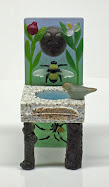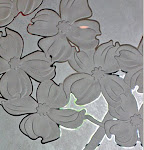
a model in progress for a pate de verre vase
unfortunately, this one did not cast well and also broke while being removed from the casting mold
This is the third (last) post in my series on making. I didn’t know it was going to be a series when I started with my first post .
I am a maker. I’m also a fixer, but primarily I am a maker. I was always making things growing up. I loved all those craft kits. I taught myself how to sew making doll clothes at a young age. My grandmother taught me how to crochet. I channeled this energy into sewing, making many of my own clothes in high school and college. I was derailed, I think, by my parents, and it took stumbling on glass to get me back on track. To my parents, artists were painters and so I was enrolled in and pointed to art classes when I should have been taking craft classes, although the drawing classes have served me well. I’ve always been happiest though when I was making things. I do call myself an artist but sculptor would actually be more accurate. Even the etched glass is really sculpture although the third dimension is very small.
Making didn’t used to be the sole domain of artists. Before the Industrial Revolution, every day people made the things they needed...soap, candles, yarn, rugs, clothing, shoes, baskets, books, dishes, containers, quilts, furniture, pillows, bedding, tools, toys, musical instruments, even your own house. And all these people making the every day things they needed to live also went that extra step to make it pretty as well as functional. If you were doing well, you were able to buy a finished product from someone who specialized in an item or technique like blacksmithing and metal working, ceramics, woodworking, sewing, weaving, clock making, book binding to name a few, but still those products were made by a person or a group of people.
With each generation removed from the Industrial Revolution, we have had fewer and fewer makers until now we have whole generations of people who have never made anything in their life, never needed to make anything. Now, our products are made by factories and machines. We go to the mall and there is everything under the sun we could ever want, all manufactured, not made. I think that we are losing a very important part of what it means to be human; to take things, to be able to take things, materials, and turn them into other, useful and beautiful things. Skills that had been handed down from mother to daughter, from father to son, from generation to generation all the way back to the dawn of modern humans are no longer being handed down and we are poorer as a species for it.
I encourage everyone to learn to make something, take a class, do not let your inner skeptic dissuade you, do not get discouraged or give up if your first attempt does not please you. If you cannot take a class, go to the library and check out a book. The only thing stopping you is fear. Everyone has a talent or skill. Discover yours.
Here is a link to the Craft in America episodes on PBS. You can watch them for free on your computer.









Hi Ellen,
ReplyDeleteThe act of creation is a meditation all unto its own. You make the most spectacular pieces.
If they have the internet and are able to read your blog then the ideas are infintesimal - you can learn to make ANYTHING on the net, I am convinced. So it is a very good suggestion [like the library or a class] and to not give up if your first try doesn't turn out well.
ReplyDeleteNice post. :)Thanks for the encouragement.
Great advice, my but that's going to be a lovely piece.
ReplyDeleteHey Ellen,
ReplyDeleteJust happen to drop by, youve got a neat blog..really nice..liked what you made, I wish it could have come out of the mould.
Keep up the great work!!!!
http://aspaceofonesown.blogspot.com
So funny you would talk of this when i was thinking this very thing today. About making soap, & all the clothes for the household (& possibly spinning & weaving them as well).
ReplyDeleteI was also thinking that most everything made then was practical. Quilts were made of scraps & often for decoration, but for the purpose of keeping warm.
We've so much to be thankful for, but don't want to lose these skills.
Despite what you said about it not casting well that vase still looks pretty incredible.
ReplyDeleteHi Ellen
ReplyDeleteI'd love to see what the final product out of the mould above will look like...
Happy days
There is a unique satisfaction that comes from crafting something with the hands. I guess it helps us to better know our selves, and our ability to create something of beauty, or function, or entertainment. It's almost an extension of the self.
ReplyDeleteLove this whole series. YES about making things, yes yes yes.
ReplyDeleteIsaac Newton made his own scientific instruments. The making of them was part of his art.
My first teacher of astrology would be horrified by computer generated charts. She insisted that drawing the charts by hand was a huge part of understanding them.
We have become a society of the mind, and in so doing we have become so weak and helpless. By we I mean most of us, not you! You are awesome. You are.
Thanks for this.
That's it - I'm going home & diving into the soy candle kit my husband brought home last month! After all, it's getting to be candle season & I think it would be fabulous to use one that we've made ourselves...
ReplyDeleteFABULOUS advice!
ReplyDeleteI love it--"manufactured, not made."
ReplyDeleteI love your blog! I left something for you in my latest ost, come and ee and get it!
ReplyDeleteYou make an interesting point here, Ellen, one I hadn't really thought of. With every gain, there seems to be a loss, and i think it's a lovely and inportant idea to keep creating!
ReplyDeletePS--I loved your response to "Kitty Kitty"! :-)
ReplyDeleteDid you sneak into my computer and read the draft of my next post? :)
ReplyDeleteI am one who doesn't make things, hasn't made things, and doesn't know how to make things.
I appreciate you showing how you make things here.
Ellen, your words are wise. With each generation after the Industrial Revolution, we have become a bit more displaced from our own hands. This ultimately displaces us from a part of our minds and souls.
ReplyDeleteYou grew up exercising your nimble hands and mind. All children should be encouraged to do this, even if they don't sense any talent in themselves. Clearly, you were holding much talent in your hands and didn't want it to slip through your fingers.
Lucky for the world, it didn't.